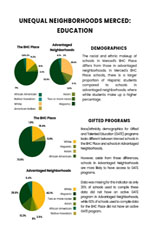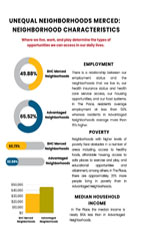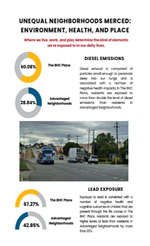Central Valley Health Policy Institute
Unequal Neighborhoods: Merced
INTRODUCTION
Nestled in the fertile San Joaquin Valley (SJV), an agricultural belt extending 300 miles through the center of California and just 110 miles from Silicon Valley, lies Merced County, California, which is home to 271,579 people. Merced, along with other areas of the SJV, has a history of policies that have shaped unequal neighborhoods, including racial segregation. Historical land use patterns laid the foundation for rural and urban racially segregated areas of poverty, and the legacy of racist policies and housing discrimination continues to affect communities today.
Segregated and unequal neighborhoods in Merced did not happen by chance but rather were intentionally created. Neighborhood segregation was reinforced through the federal government’s role in discriminatory housing policies including redlining, differentials in interest rates and loans, land use controls, deed restrictions, and zoning regulations (Gross, 2014). This segregation has resulted in inequalities in resources and opportunities, disparities in education, and differences in health outcomes between north Merced and southwest Merced/east Merced County.
Although the historical policies and codes that helped create inequality were put in place decades ago, policies based on race/ethnicity, social class, and other forms of systematic discrimination have had a large impact on what neighborhoods in Merced look like today.
Policy Timeline
View the Merced Historical Policy Timeline 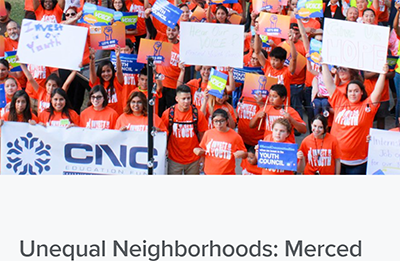
Neighborhood Infographics
Unequal Neighborhood: Introduction
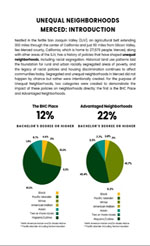
The BHC Merced place is comprised of over 64,000 people across 14 census tracts. The communites in the place were historically excluded from investment and lacking amenities created current unequal nieghborhoods in Merced. Compared to advantaged neighborhoods, the BHC Merced place falls behind in educational attainment.
View the Introduction Infographic
Unequal Neighborhood: Education
Access to educational resources for student success is important for their future. Merced faces disparities in the amount of GATE programs that is available in each community.
View the Education Infographic
Unequal Neighborhood: Neighborhood Characteristics
Economic opportunities in neighborhoods can create social mobilty and improve health outcomes. The access to the opportunities is different and creates challenges for some Merced communities.
View the Neighborhood Infographic
Unequal Neighborhood: Environment Health, and Place
Where someone lives can greatly affect their health, communities that are exposed to more environmental hazards see disportionate health disparites.
View the Environment, Health, and Place infographic
EAST AND SOUTHEAST ASIAN AMERICANS IN MERCED
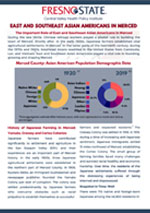 Merced has been home to many Asian communities that have shaped the city of Merced.
Despite their contributions, Asian communities faced racial discrimination, segregation,
and other challenges. The historical prejudice created current institutional inequities.
The report highlights solutions for Southeast Asians to address disparities and increase
opportunities and access in Merced that are ongoing.
Merced has been home to many Asian communities that have shaped the city of Merced.
Despite their contributions, Asian communities faced racial discrimination, segregation,
and other challenges. The historical prejudice created current institutional inequities.
The report highlights solutions for Southeast Asians to address disparities and increase
opportunities and access in Merced that are ongoing.
Webinar, November 9th, 2023, Unequal Neighborhoods: Merced
View the presentation slides
Suggested Citation
Corona, G., Corona, K., Conley, A., Jansky, A., Pacheco-Werner, T. L., Ramirez, A., & Garcia, M. (2024). Unequal Neighborhoods Merced. Central Valley Health Policy Institute. California State University, Fresno.
For more information contact
Amanda Conley, MA, PhD (c)
Research Scientist
amconley@csufresno.edu
Tania Pacheco-Werner, PhD
Executive Director
559-278.6603
tpacheco@csufresno.edu
Funded by:
